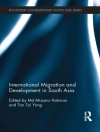This volume explores Japan’s industrialization from the perspective of "indigenous development", focusing on what may be identified as "traditional" or "indigenous" factors. Japanese industrialization has often been described as the process of transferring or importing technology and organization from Western countries. Recent research has, however, shown that economic development had already begun in pre-modern period (Tokugawa-era) in Japan. This economicdevelopment not only prepared Japan for the transfer from the West, but also formed the basis of the particular industrialization process which paralleled transplanted industrialization in modern Japan. The aim of the volume is to demonstrate this aspect of industrialization through the detailed studies ofso-called "indigenous" industries. This collection of papers looks at the industries originating in the Tokugawa-era, such as weaving, silk-reeling and pottery, as well as the newly developed small workshops engaged in manufacturing machinery, soap, brash, buttons, etc. Small businesses in the tertiary sector, transportation and commerce, are also observed. Available for the first time in English, these papers shed new light on the role of "indigenous development" and our understanding of the dualistic character of Japan’seconomic development.
Masayuki Tanimoto
Role of Tradition in Japan’s Industrialization [PDF ebook]
Another Path to Industrialization
Role of Tradition in Japan’s Industrialization [PDF ebook]
Another Path to Industrialization
购买此电子书可免费获赠一本!
语言 英语 ● 格式 PDF ● ISBN 9780191522017 ● 编辑 Masayuki Tanimoto ● 出版者 OUP Oxford ● 发布时间 2006 ● 下载 6 时 ● 货币 EUR ● ID 2272630 ● 复制保护 Adobe DRM
需要具备DRM功能的电子书阅读器












